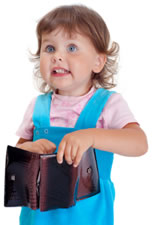
 Little Tealeafs
Little TealeafsWhat to do when children steal
by Sophie Cross
I want everyone to put a hand up, classroom style (does that feel uncomfortable?). OK, put your hand down if you ever took any money out of your mum's purse. Put your hand down if you ever "borrowed" another child's toy without asking first. Put your hand down if you ever nicked a sweet or other low value item from the local shop. Put your hand down if you ever took something home from school and didn't take it back… You can see where I'm going with this, can't you?
I imagine there are very few of you with your hands still up and if you do still have a hand up, you are most likely suffering from memory loss or were too young to process the memory of the event in the first place.
Children steal. Fact. But stealing is really a very adult term put onto an action of taking something that's not yours. However it doesn't actually mean much to a child until the age of about 5 or so. Children are impulsive. They see things and take them without much notion as to the ownership of property and whether it's right or wrong to take something that isn't technically theirs. They will pick up sweets, grapes or other easily obtainable item in a shop and eat them until you tell them that's not the right thing to do and teach them the consequences of doing so.
Stealing as a small child isn't generally an issue. It's all part of their development. It can be a problem when it continues and becomes habitual after the age when they should understand right from wrong and the concept of ownership, possession and also consequences – both for themselves and the person he or she is stealing from.
Here are some tips to dealing with sticky fingers:
Don't panic. If your child steals something, it doesn't generally mean they will turn into a delinquent and be banged up by the age of 16.
Small children are particularly fond of their friends' beads, necklaces, coins, scented erasers, Matchbox cars, Lego, items of clothing etc. They take them purely because they like them and want them. It's very simple to them! And pre-schoolers really have no mal-intent, but are purely acting on impulse without any sense of wrongdoing.
Teach them ownership. In a very small child's mind everything is theirs. There is also the concept of "wishful ownership", i.e. what they want to be theirs and "finders keepers". When my little girl was young, things would often appear in her room or bag after she'd been at friends' houses or they'd been at ours.
If this happens, explain that if they want to borrow something, that's fine, but they have to ask first. Make them return the item and explain that, "you can't just go around taking other people's things just because you like them, because they're precious to your friends, just like your things are precious to you".
Teach them understanding and empathy. Put them in the shoes of the other child. How would they feel if one of their friends had taken their favourite toy?
Teach them consequence and correction. I very clearly remember my friend and I being marched back to a newsagent by my friend's mother when we were about 6 to return some tiny sweets we had taken. We were made to say sorry and own up to stealing them. The shopkeeper was very nice about it. We were mortified. But it was teaching us the consequence of stealing and also how to correct it.
Teach them to value their own property. Teach them to understand the importance of their own "things" and therefore the importance of their friends' things to their friends. Eventually this will sink in.
Lead them not into temptation! Teach them the concept of property, trust and also not to put things in the way of temptation for others. Young children view the property of family members for example as pretty much communal. Give them a sense of their own things. Encourage them to put their coins into a moneybox; to put their special jewellery into a locked jewellery box; to store their favourite toys in a special place or out of harm's way; to knock before you go into your sibling's room etc.
This not only helps them understand that they have their own things that are special, but that other people do as well. It also puts temptation out of friends' way. If their money or jewellery is in its safe place and locked away, it's less likely to be nicked by a visiting friend!
Praise honesty. When your child admits to taking something and is prepared to accept the consequences and say sorry, give them praise for this. It's important to let them know that honesty is rewarded.
By 5-7 years old they will have developed a vague sense of right and wrong, although it's often more the case that children understand they will be castigated for stealing and fear the consequences, rather than really understanding the idea that stealing is wrong.
But what happens when the child is old enough to understand the concept of property and right from wrong and is still stealing?
Stealing in slightly older children usually has a trigger. Try to identify it. What is prompting them to steal? Money? Jealousy? Anger? Attention seeking?
Children who habitually steal often have low self-esteem or an imbalance of impulsiveness (i.e. high impulsiveness and low control) and this can be down to much more deep-seated problems, so it's very important to try to identify what is going on and to deal with any issues accordingly.
Children at risk of antisocial behaviour like stealing are often those with poor self-esteem, impulsiveness, anger, a change in family situation or domestic upheaval, general boredom/lack of stimulation or being left alone a lot. Some undetected medical problems could also be at work, such as autism or Asperger syndrome (where children often can't socialize or empathise in the same was as other children) or perhaps other learning difficulties.
At the end of the day it's very important to get to the bottom of habitual stealing and lying before it's too late. These sorts of problems will only get worse to the point where children can quite effectively desensitize themselves to wrongdoing and therefore feel no remorse.
If you feel stealing is an ongoing issue with your child, it's very important to seek advice. Talk to your child's child care centre or school teacher and if it continues you should go to your GP and take it from there as necessary.
© 2012 - All rights reserved
Care For Kids Internet Services Pty Ltd
ABN 55 104 145 735
PO Box 543 Balmain NSW 2041
privacy policy contact us
